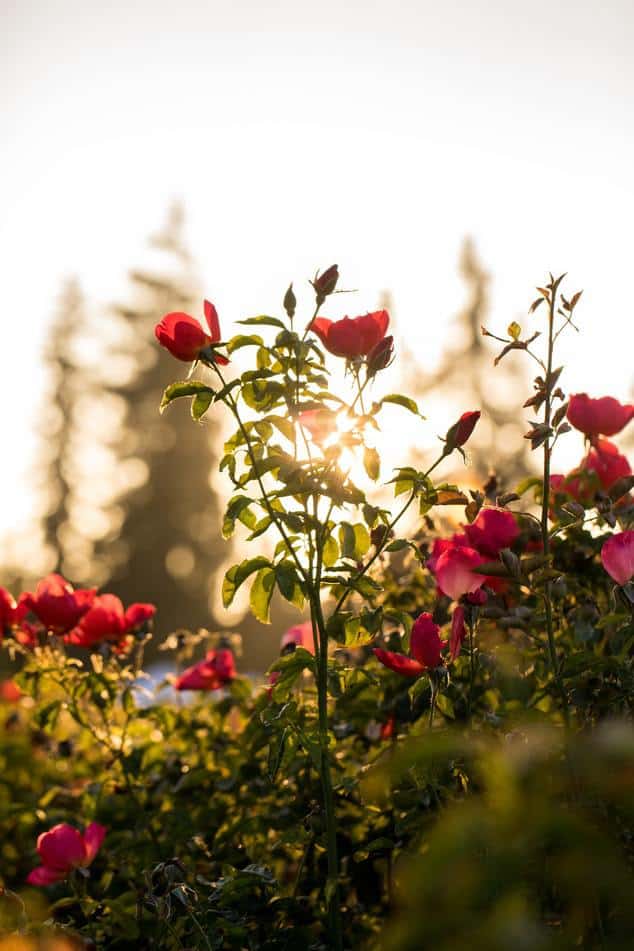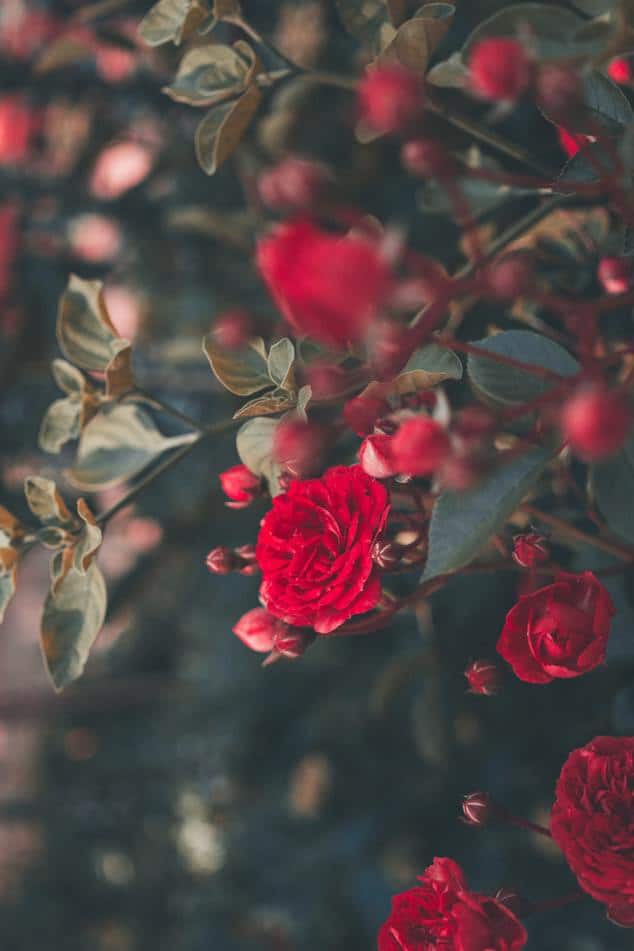When planting some new rose bushes, every gardener hopes for a time when their roses will bloom. This is not always the case since sometimes your roses may not fully grow even when you have done everything in your knowledge. There are several reasons why this is the case, and while it is not a simple problem to solve, with enough patience, you can get the desired results. The following is a comprehensive guide on what could be wrong with your bush, how to solve these issues and get the most from your garden.
Why Aren’t the Roses Blooming?
If you are wondering why my rose bush is growing but not blooming, the answer is that something is lacking. Depending on what you are doing, the following reasons should give you exactly what you are looking for:
Fertilizer
You can use any type of fertilizer for your rose bush, whether it is in liquid, pellet, granular, or powder form. However, if you use too little, it may be the reason why your roses are not blooming. If you use too much, it may burn the roots of your plant such that it may grow but not bloom.
It’s also possible that you’re also using the incorrect ratio of the fertilizer. Usually, you need nitrogen, phosphorous, and potassium. If you use two components without one or in the inappropriate quantities, it may affect the likelihood of your roses blooming.
Sunlight
When planting rose bushes, you must have known that they require at least six hours of sunlight daily. With minimum exposure to the sun, the plant can make adequate food for healthy leaves, but it won’t be enough for the growth of its flowers. If you have been using the correct fertilizer, then check whether your rose bushes are receiving adequate sunlight.
You should pay more attention, especially if you have climbing roses, which may often go under a shade and get trapped. Lack of adequate sunlight also means that your plant is at a higher risk of developing a fungal infection. If your roses get affected, they will not bloom.
Water Stress
Roses bloom best in moist-airy soil, so you have to water your plants adequately depending on the type of soil and rainfall. Too little water can keep your rose plant growing such that it will still be green and look healthy generally. This is because it conserves energy, which is essential in keeping it alive meaning that it is not using any in growing flowers.
Check that you are also not overwatering your flowers since this also puts stress on the plant since it is unable to absorb nutrients from the soil. If the ground feels wet and muddy to the touch, then you may be using too much water on your rose bushes.
 Over pruning
Over pruning
If you get excited about your plants, you will likely spend a lot of time in your garden. This will often make you tempted to make changes, and that is why many gardeners are quite handy with pruning shears. While there are plants that require frequent pruning, roses are not in this category, so it is easy to damage your plant but pruning too much. Don’t be tempted to prune a relatively young bush since you could overdo it. Climbing roses especially only need pruning once a year when it has reached maturity.
Time
Roses require a lot of patience for them to grow and start blooming, so you shouldn’t be in a hurry. Many gardeners may start looking for problems, yet the plant simply requires more time to grow and mature. Some types of roses can take up to three years to start blooming, so check before planting, so you know what to expect. However, ensure that you are attentive along the way so that you are in a position to know when something is amiss.
How Do You Get Roses To Bloom?
Once you realize that there are no roses on my rose bush, the first step is to find out the cause. The following solutions should help you ensure that your roses bloom as expected.
Adequate Fertilizer Ratio
One of the biggest mistakes that a gardener may make is using too much nitrogen fertilizer, which may cause stunted growth, and it will not bloom. The best nitrogen, phosphorous, and potassium ratio for most roses is 1:2:1. If there is an imbalance, then know it will impact blooming in some way, so you have to correct it. Most fertilizers will have the ratios indicated on the pack, which is why you should be keen when purchasing.
Note that while all types of fertilizer can be used on your rose bushes, liquid options are best since they get absorbed faster, and it is almost impossible that they may burn the roots. If your roses are prone to getting infected, you should check out combo options. These changes and a little patience should ensure a beautiful bloom.
Watering
If there is low to no rainfall, you should water your roses only twice a week and not anymore unless you live in a mainly dry area. If you notice that the soil is quite wet and muddy, you should immediately stop watering until the land is dry then start a proper watering schedule.
If your soil doesn’t hold water too well, then this is a problem that you can solve by applying a dense layer of mulch. Approximately four inches of compost is excellent to introduce more organic matter into the soil which your rose bushes need.
Pruning
After about three years, roses are usually ready to prune, do not cut any stems before then. The only thing you should look out for before they are mature is the rots and any parts that are looking unhealthy. When you prune, ensure to eliminate the weakest stems and leave only about three that are strong. This is important since it helps the bush redirect energy to those stems so they are more robust, healthier, and they can bloom.
How Do You Get Roses to Bloom All Summer?
When you want your roses to bloom all summer, it will require that you make continuous efforts to take care of the plant. The following tips should help you maintain your flowers so that they bloom all season.
Water frequently
Summers tend to be very hot and dry; hence your roses won’t bloom throughout. The plant uses this time to conserve energy meant to keep it alive, so there is not much to grow new flowers. If you want the bloom to last the entire season, then you should water frequently. So keep checking the moisture content in the soil and top up whenever necessary. Ensure that there is no water on the leaves at night to prevent mildew.
Fertilizer
After the first bloom, you should apply granular fertilizer to your bush to give it more energy so it can bloom again. Leave the granular fertilizer for two weeks then use the liquid kind to supplement the fertilizer since it gets absorbed faster. You can do this after each bloom, so you are sure of a whole season of beautiful roses.
Trimming
You should cut all flowers from the previous bloom so the plant may start preparing for the new ones when the conditions are right. Ensure that you trim off any dead blooms so it can begin anew.

How Do I Get More Roses on My Rose Bush?
If you get your first bloom, but your flowers are fewer, don’t worry since it is possible to make roses bushier. Use the following tips to get more flowers on your rose bush:
Feed the Bush
Roses feed a lot, which means that you need to satisfy the bush, so you get more out of it. This is why you should work on using fertilizer as often as recommended and try to mix up the types. Many people use granular fertilizer, which is excellent since it is richer, but it works slowly. Try to incorporate liquid fertilizer as well since they work faster hence will supplement and lead to more flowers.
Prune Regularly
Pruning not only allows the bush to save energy, but it also helps with air circulation and reduces friction between the stems. Look out for any stems growing horizontally and cut them off as well as reducing the number of stems, especially those looking weakly.
Egg Shells
Other than increasing mulch on your bush, eggshells are a great source of calcium, which is vital for strengthening the plant. It also encourages a healthy bloom. Crush up some eggshells and add them on top of the soil around the bush. If your roses are still in pots, you can mix it into the ground when transferring.
Pest Control
It is common to find pests on your bush, depending on where you live, but controlling them is the most crucial part. Systemic pesticides are best since they fight insects from the inside as they are mixed into the soil. Avoid spraying since this can have various effects on the plant as well as the useful insects.
If you have a rose bush or you want to plant one, the most important thing is to be very keen on everything that goes into your plants. You need a lot of patience since it needs time but seek new information and styles whenever you suspect something isn’t right.

 Over pruning
Over pruning